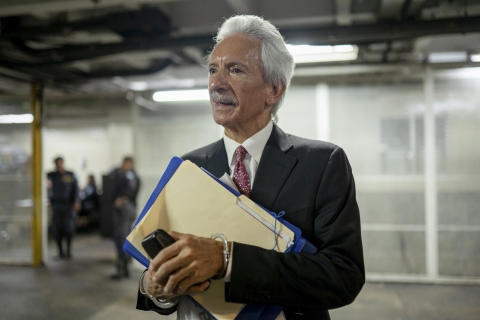
Renowned Guatemalan journalist José Rubén Zamora, who has been behind bars since July 2022 in pre-trial detention, was sentenced June 14 to six years in prison on spurious money laundering charges. This follows the closing of his news outlet, elPeriódico, in May, after sustained economic and political harassment, including against nine additional members of elPeriódico’s newsroom.
Dear José Rubén,
Some of our names you will recognize, others you may not. But we enjoy a fellowship: Like you, we are recipients of the ICFJ Knight International Journalism Award, and like you, we deeply believe that independent journalism is vital to inform and empower the public.
For a generation of Guatemalans, elPeriódico delivered unflinching investigative reporting under your leadership, exposing those in power who abused their positions and misused public funds. You and your colleagues did this despite physical attacks, threats and ongoing attempts from successive Guatemalan governments to economically crush your news outlet.
It is devastating that today, the government of Alejandro Giammattei has muzzled elPeriódico’s reporting and that you, one of the most celebrated journalists in Latin America, are behind bars. The authorities targeted you, delivering a message to all truth tellers: Independent journalism has no place here.
You deserve to be free, and the Guatemalan people deserve better. From across the world, we stand with you. We call on authorities to release you immediately. We call on the Guatemalan government to stop harassing your colleagues. And we call on others in the international community to draw attention to your case – an alarming bellwether of the state of press freedom in Guatemala, Central America, and many of our own countries.
In these times of democratic backsliding and rising attacks on a free press, it can be difficult not to despair. But your courage and steadfast commitment to journalism give us all hope and inspire us to do the hard work of speaking truth to power.
In solidarity,
Karam Al-Masri (Syria)
Roman Anin (Russia)
Justin Arenstein (South Africa)
Carmen Aristegui (Mexico)
Corina Cepoi (Moldova)
Umar Cheema (Pakistan)
Carlos Dada (El Salvador)
Stevan Dojčinović (Serbia)
Priyanka Dubey (India)
Rocío Idalia Gallegos Rodríguez (Mexico)
Pavla Holcová (Czech Republic)
Natália Leal (Brazil)
Sami Mahdi (Afghanistan)
Evgeniy Maloletka (Ukraine)
Frank Nyakairu (Uganda)
Geoffrey Nyarota (Zimbabwe)
Sharmeen Obaid-Chinoy (Pakistan)
Oluwatoyosi Ogunseye (Nigeria)
Miranda Patrucic (Bosnia and Herzegovina)
Joseph Poliszuk (Venezuela)
Paul Radu (Romania)
Maria Ressa (Philippines)
Yoani Sánchez (Cuba)
Anisa Shaheed (Afghanistan)
Rose Wangui (Kenya)